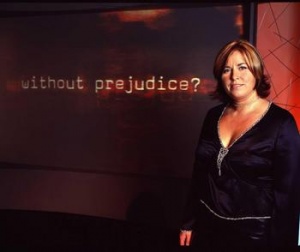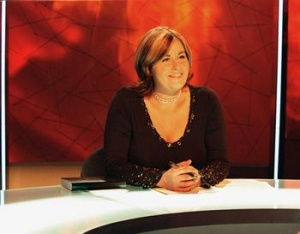Without Prejudice?
Contents |
Host
Co-hosts
Voiceover: Kieron Elliott
Broadcast
12 Yard for Channel 4, 4 January 2003 to 16 April 2004 (14 episodes in 2 series)
Synopsis
A panel is challenged to award "a life-changing sum of money" (£50,000 in the first series, £20,000 in the second) to one person; can they judge Without Prejudice?
Five people are on the panel, and there are five potential recipients. In the first round, each of the recipients give their name, age, and location via filmed inserts. Based only on this information, the panel must decide which of the recipients is not going to get the top prize. It's as brutal as the opening round of Judgemental, and the panel are basing their decisions on as little information.
Four remain for the second phase, where three of six filmed inserts are shown for each remaining recipient. The recipients can talk about their backgrounds, their work, their opinions on some controversial subjects. After these inserts, the panel deems another recipient unworthy of the cash, and commercials air.
The remaining inserts are shown in the third phase, including a potential killer - a tempting situation and a hidden video camera to show scruples, or lack thereof. Again, after these inserts play, there's a little more discussion, another recipient loses out, and more ads.
We're now down to two recipients, who meet the panel in turn, and answer their questions. The panel is not allowed to ask what the recipients would do with the money, and it's unclear what would happen if the recipients volunteered this information. The panel votes, the winner is determined, and the money awarded.
A panel of five ensures that, aside from the first round, no tie cannot be broken. At the end of the show, there are brief pieces to camera by all five recipients. These work, because it's the only chance those not awarded the money get to respond to the panel, however indirectly.
Some changes for the second series included the panel giving their votes in front of the recipients, and a greater structure to the middle part of the game.
Without Prejudice works on many levels. At its most basic, there are strategies for recipients who want to win the money. Should the recipients disguise their true feelings and play to a liberal consensus, or will the panel welcome an honest, open approach? Would this work if the panel if full of reactionaries?
Ultimately, this is not a show about awarding large chunks of money. This is a show about the decision making process. The recipients are not the focus of the show; they are the mechanic through which a fascinating investigation into psychological pressure and decision making takes place.
Will the members of the panel be able to approach the task without relying on basic stereotypes and crude assumptions? If not, how quickly will they want or be able to shed them in the face of contradictory evidence? And how will the members of the panel react with each other? Will they attempt to bring round the others to their way of thinking, or will they allow one outlying opinion to continue almost unchallenged, given that one person may just be able to change the result?
 Host, Liza Tarbuck
Host, Liza TarbuckIn all of this, Liza Tarbuck moderates the discussion. She doesn't lead it, she ensures that it stays within the defined boundaries, and is the only one to talk directly to the recipients before the fourth phase. Her role is understated but crucial.
Without Prejudice is a process show; the money is only there to concentrate discussion. The Panel sits in judgement on The Recipients, seeing if they can judge on the evidence in front of them. The Viewing Public sits in judgement on The Panel, seeing if they can judge on the evidence on the screen. Then the Viewing Public looks at itself, spots that it's not working without prejudice, and goes off and has another think. This is the prize, getting the Great Viewing Public to think about how they view other people and hence themselves.
Inventor
12 Yard Productions



